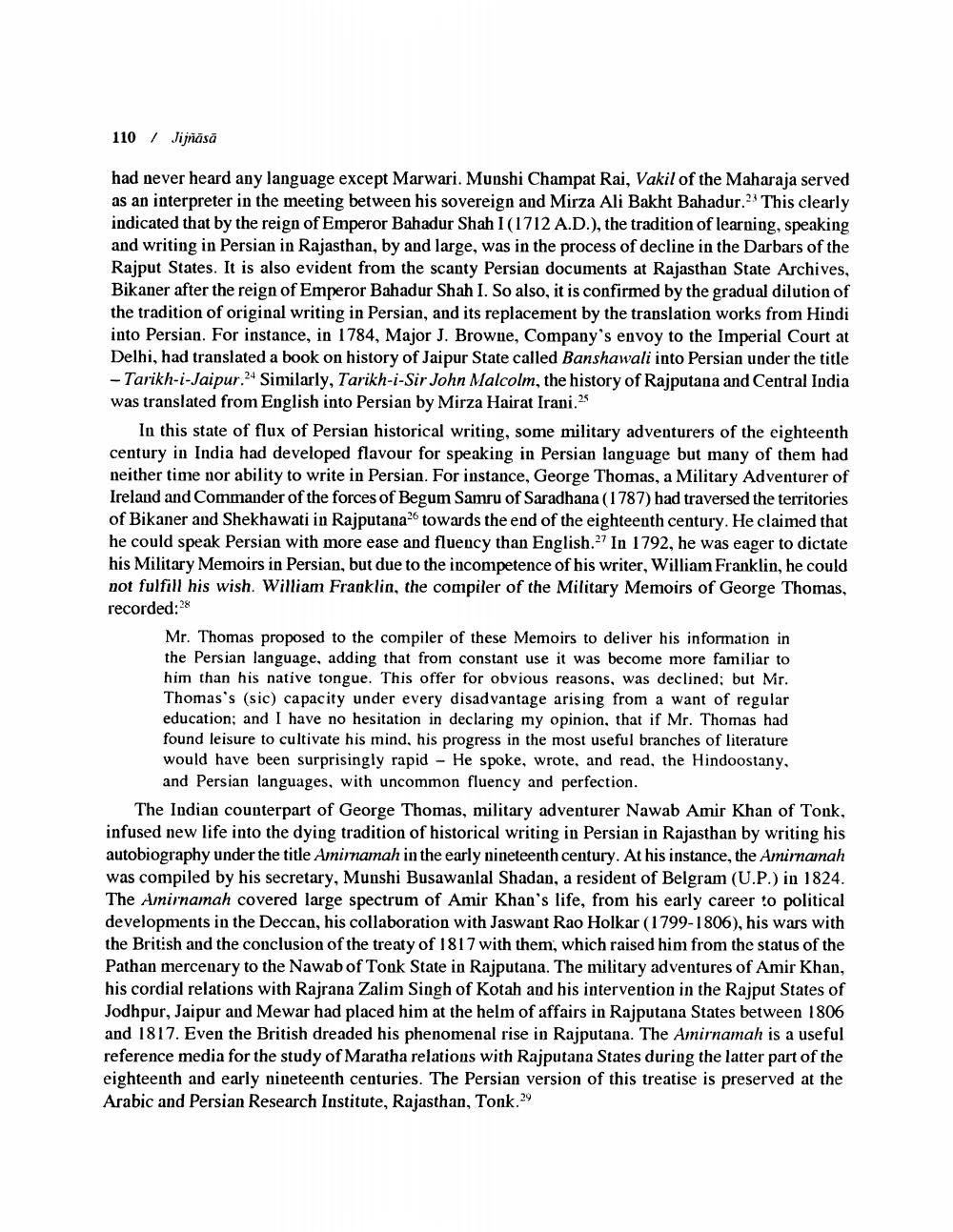________________
110
/ Jijñāsā
had never heard any language except Marwari. Munshi Champat Rai, Vakil of the Maharaja served as an interpreter in the meeting between his sovereign and Mirza Ali Bakht Bahadur.? This clearly indicated that by the reign of Emperor Bahadur Shah I(1712 A.D.), the tradition of learning, speaking and writing in Persian in Rajasthan, by and large, was in the process of decline in the Darbars of the Rajput States. It is also evident from the scanty Persian documents at Rajasthan State Archives, Bikaner after the reign of Emperor Bahadur Shah I. So also, it is confirmed by the gradual dilution of the tradition of original writing in Persian, and its replacement by the translation works from Hindi into Persian. For instance, in 1784, Major J. Browne, Company's envoy to the Imperial Court at Delhi, had translated a book on history of Jaipur State called Banshawali into Persian under the title - Tarikh-i-Jaipur.24 Similarly, Tarikh-i-Sir John Malcolm, the history of Rajputana and Central India was translated from English into Persian by Mirza Hairat Irani.2
In this state of flux of Persian historical writing, some military adventurers of the eighteenth century in India had developed flavour for speaking in Persian language but many of them had neither time nor ability to write in Persian. For instance, George Thomas, a Military Adventurer of Ireland and Commander of the forces of Begum Samru of Saradhana (1787) had traversed the territories of Bikaner and Shekhawati in Rajputanaas towards the end of the eighteenth century. He claimed that he could speak Persian with more ease and fluency than English.27 In 1792, he was eager to dictate his Military Memoirs in Persian, but due to the incompetence of his writer, William Franklin, he could not fulfill his wish. William Franklin, the compiler of the Military Memoirs of George Thomas, recorded:28
Mr. Thomas proposed to the compiler of these Memoirs to deliver his information in the Persian language, adding that from constant use it was become more familiar to him than his native tongue. This offer for obvious reasons, was declined; but Mr. Thomas's (sic) capacity under every disadvantage arising from a want of regular education: and I have no hesitation in declaring my opinion, that if Mr. Thomas had found leisure to cultivate his mind, his progress in the most useful branches of literature would have been surprisingly rapid - He spoke, wrote, and read, the Hindoostany,
and Persian languages, with uncommon fluency and perfection. The Indian counterpart of George Thomas, military adventurer Nawab Amir Khan of Tonk, infused new life into the dying tradition of historical writing in Persian in Rajasthan by writing his autobiography under the title Amirnamah in the early nineteenth century. At his instance, the Amirnamah was compiled by his secretary, Munshi Busawanlal Shadan, a resident of Belgram (U.P.) in 1824. The Amirnamah covered large spectrum of Amir Khan's life, from his early career to political developments in the Deccan, his collaboration with Jaswant Rao Holkar (1799-1806), his wars with the British and the conclusion of the treaty of 1817 with them, which raised him from the status of the Pathan mercenary to the Nawab of Tonk State in Rajputana. The military adventures of Amir Khan, his cordial relations with Rajrana Zalim Singh of Kotah and his intervention in the Rajput States of Jodhpur, Jaipur and Mewar had placed him at the helm of affairs in Rajputana States between 1806 and 1817. Even the British dreaded his phenomenal rise in Rajputana. The Amirnamah is a useful reference media for the study of Maratha relations with Rajputana States during the latter part of the eighteenth and early nineteenth centuries. The Persian version of this treatise is preserved at the Arabic and Persian Research Institute, Rajasthan, Tonk.29




